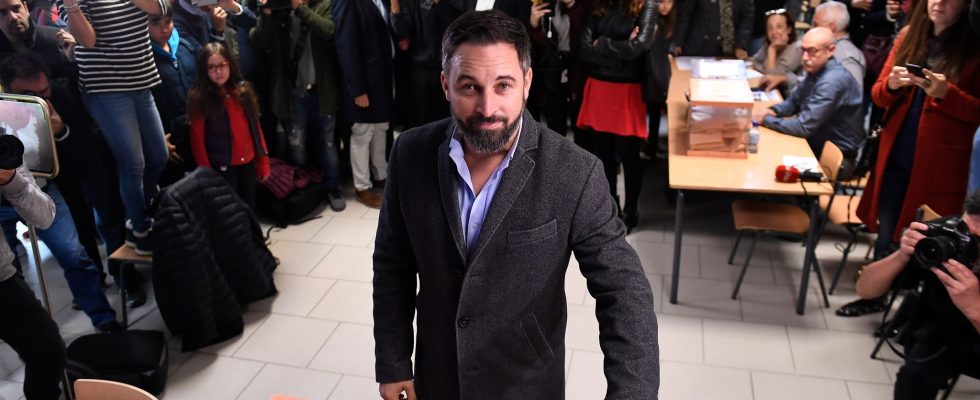A strange tandem could take the reins of Spain at the end of the summer. Alberto Nuñez Feijoo, 61, boss of the Popular Party (PP, right) and Santiago Abascal, 47, head of Vox (far right), are given the winners by the polls in the early legislative elections of July 23. Called after the defeat of his camp in the municipal and regional elections on May 28 by the current chief executive, the socialist Pedro Sanchez, the ballot comes at the worst time for Europe. Because on July 1 Madrid takes over the rotating presidency of the Council of the European Union (EU) for six months – i.e. the last window of opportunity, before the European elections in June 2024, to deal with the migration pact, the stability pact, artificial intelligence or the enlargement to Ukraine and Moldova, for which a verdict is expected next December.
This is not the first time that EU presidencies have been disrupted by the concomitance of national elections, the latest example being that of France, which held its presidential and legislative elections in the spring of 2022. Except that this had been largely anticipated by the French and by Brussels. This time, the schedule was changed at the last minute. And it is those nostalgic for the Franco dictatorship, unfavorable to a more integrated Europe, who are in ambush in Madrid. Positioned on the far right of the political spectrum, Vox was born in 2013 out of strictly Spanish considerations, from a core of PP activists who accused their party of collusion with Basque and Catalan separatists. “Since then, Santiago Abascal’s small boat has caught the wind of European right-wing populism by seizing migration and sovereignty issues,” observes historian Benoît Pellistrandi, professor of senior chair at Lycée Condorcet.
In Spain, the rise of Vox risks complicating the equation of the People’s Party, its likely coalition partner. When he was brought to the head of the PP in April 2022, Alberto Feijoo, who until then had presided over Galicia, had sworn to stem the rise of the far right. He then hoped to govern Spain without Abascal. But, on June 17, their two formations concluded municipal agreements in more than 140 municipalities. They have also forged a regional coalition pact in the autonomous community of Valencia – an unprecedented gesture since Franco’s death in 1975. Everywhere, Vox is waging war on feminists, asserting that climate change is “a scam” and promising to return to the right to abortion and on euthanasia, authorized for two years… If it enters the government at the start of the school year, the far-right formation will inevitably put pressure on the PP. Its influence then risks reverberating as far as Brussels. For political analyst Eduardo Bayon, two scenarios are possible: “Either the legislative elections of July 23 give rise to a classic alternation [NDLR : entre le Parti socialiste de Pedro Sanchez et le PP] and they won’t affect the EU presidency, either Vox gets ministerial portfolios [NDLR : dans la future coalition] and Spain will join the list of member states where the far right governs – Italy, Hungary and, since mid-June, Finland – promoting an individualist model of society. It would be a new deal.”
“A more authoritarian policy”
In this case, “the PP would then be pushed to implement a more authoritarian policy, like Poland, or more restrictive in terms of migration policy or minority rights, like Hungary, notes the economist Josep -Maria Arauzo-Carod, from the University of Tarragona. But this policy would pose significant problems, given the weight of Spain in Europe. It would create a permanent hotbed of conflict which would fragment European cohesion on key issues”. A shame for a country that has never been touched by Euroscepticism, even if it cultivates very strong ties with the United States and Latin America, and a very utilitarian vision of Europe, in which it sees above all a lever for modernization through economic integration. In the 1990s, didn’t Jacques Delors say that the Spaniards were “the best Europeans”?
Madrid also knows how to place its pawns perfectly in the community bodies: the Catalan Josep Borrell has been High Representative of the European Union for Foreign Affairs since 2019, while several Spaniards have chaired the European Parliament in the past: the conservative José Maria Gil-Robles, the socialist Enrique Baron Crespo… Personalities who, through their diversity, embodied a form of resilience in the face of the vagaries of Spanish political life. “If, after July 23, Feijoo makes an alliance with Abascal to build a majority, its priority will not be to modify the European agenda established for months by the Sanchez government. There will not be time for it”, predicts Marc Cases, political consultant in Barcelona.
In any case, Pedro Sanchez has taken steps to ensure that the Spanish presidency of the EU does not turn into a cacophony. Scheduled for July, his big speech on Spanish priorities, namely ecological transition, reindustrialization and social justice, has been postponed until August to prevent it from colliding with the results of the legislative elections. And that Brussels is reassured. Even if the left is defeated, its ministers will manage current affairs until mid-September.
